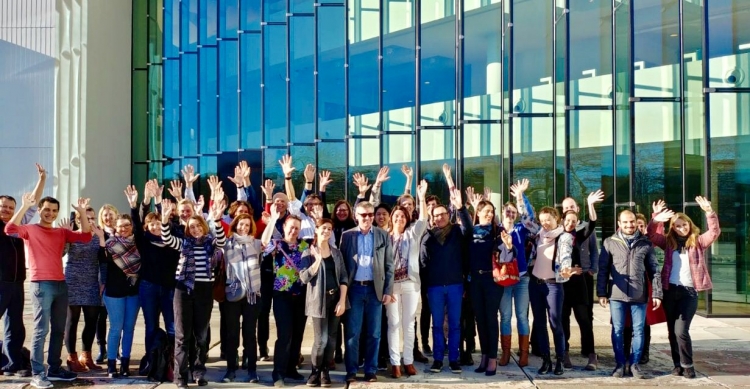A website predicting AMD risk undergoes finalisation at the 8th meeting of EYE-RISK

The Meeting of the EYE-RISK Consortium was held at Rotterdam’s ERASMUS Medical Centre on 14-15 February 2019
Given that Age-Related Macular Degeneration (AMD) is a highly complex disease, research into its causes and development requires the use of a systems medicine-based approach. Hence, this project involves the collaboration of researchers of multiple disciplines such as geneticists, epidemiologists, basic scientists, computer scientists and ophthalmologists.
Up to now, researchers have focused on the main risk factors related to age, genes and lifestyle. However, this project explores how these factors interact to cause the Age-Related Macular Degeneration (AMD) and the reasons why it affects one person and not another. The Consortium has investigated how genetics, nutrition and age interact and affect eye health. This knowledge will facilitate the ability to provide personalised care for the patient’s health in the future.
During the meeting in Rotterdam, the researchers presented and discussed their most recent results in the fields of epidemiology and risk prediction, molecular phenotypes and biomarkers, models, pathways and controllers, as well as their application to clinical practice and outreach. All this enables us to identify, examine and discover new responses for this disease.
The results of the analyses carried out on data from 60,000 participants of large European cohorts and biobanks were also presented. EYE-RISK is the first project to combine, unify and interpret all this data. The frequency of the disease throughout Europe is now known and predictions are being made.
Of particular note was the presentation of a new risk prediction tool that tests genetic predisposition by analysing all known AMD genes. Genetic information is combined with clinical vision tests and lifestyle information. Based on all this data, a computational risk prediction tool can calculate a person’s AMD risk and help them to improve their lifestyle in order to decrease this. This work session enjoyed the participation and assistance of Prof. Dr Monique J. Roobol of ERASMUS University, who shared her experience in developing a prostate cancer risk prediction website. The subsequent debate identified those aspects that need to be improved prior to the launching of this new website.
The meeting concluded by expressing special gratitude to the project coordinators: Prof. Marius Ueffing of the Institute for Ophthalmic Research, Centre for Ophthalmology of the University of Tübingen and Prof. Caroline Klaver of the Erasmus Medical Centre’s Department of Ophthalmology and Epidemiology and all their team, who have supported the 14 partners throughout this European project.
